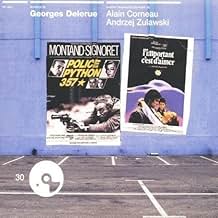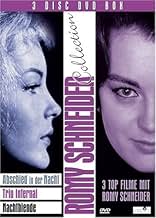Servais Mont, a photographer, meets Nadine Chevalier who earns her money starring in cheap soft-core movies. Trying to help her, he borrows the money from the loan sharks to finance the thea... Read allServais Mont, a photographer, meets Nadine Chevalier who earns her money starring in cheap soft-core movies. Trying to help her, he borrows the money from the loan sharks to finance the theatrical production of 'Richard III' and gives Nadine a part. Nadine is torn apart between S... Read allServais Mont, a photographer, meets Nadine Chevalier who earns her money starring in cheap soft-core movies. Trying to help her, he borrows the money from the loan sharks to finance the theatrical production of 'Richard III' and gives Nadine a part. Nadine is torn apart between Servais, for whom she is falling in love, and her husband Jacques, to whom she has moral ob... Read all
- Awards
- 2 wins & 3 nominations total
- Le père de Jacques
- (scenes deleted)
- La mère de Jacques
- (scenes deleted)
- (as Andree Tainsy)
- Le médecin à l'hôpital
- (as Robert Dadies)
- …
Featured reviews
Romy Schneider got the Cesar award for her performance here; she pulls out all the stops to create this gifted but battered-by-life character. Pity that Zulawski couldn't craft a more balanced film around her.
In fact, I would say most of the movie is spent on producing "art" that you are not proud of. This theme is throughout the movie. You get the impression that it is being bolted into your nerves like a physical trauma bolts in disdain.
We also deal with the end of youth and how we cope with it. The film is indeed extremely raw. The scenes are meant to be honest and to the point. We get very little sidestepping when it comes to the point of scenes. Perhaps the actors will discuss things in a roundabout way, but the theme slices through each scene like a scimitar.
On the subject of love. This is very important to the movie as well. Even though there are virtually no signs of it til the very end, there is a longing for it. And that is what most good romances are about. Sydney Pollock once said something to the effect of, the interesting part of a Romance Film is the longing for the connection between the characters. You can have a couple of slow motion scenes of them waltzing through the park and feeding each other fruits, but that isn't what drives the story and the film. Perhaps that is why this film is so good.
Did you know
- TriviaRomy Schneider considered this movie her best work.
- Quotes
Jacques Chevalier: J'ai rêvé de toi. Tu me versais du Coca-Cola dans l'oreille... Une vilaine mort, croyez-moi !
- Alternate versionsItalian video version excludes some violent and explicit erotic scenes and runs 105 min.
- ConnectionsFeatured in La mano negra (1980)
- How long is That Most Important Thing: Love?Powered by Alexa
Details
Box office
- Gross US & Canada
- $19,120
- Opening weekend US & Canada
- $5,370
- Jul 16, 2017
- Gross worldwide
- $19,120
- Runtime
- 1h 49m(109 min)
- Sound mix
- Aspect ratio
- 1.66 : 1
























